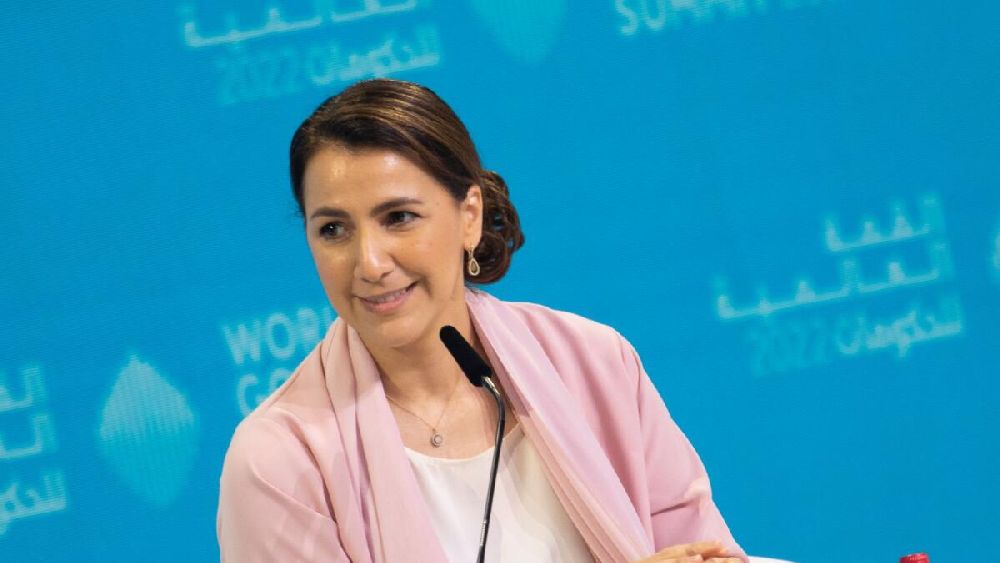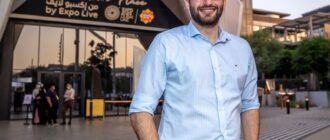
.
As curtains come down on Expo 2020 Dubai on Thursday, Khaleej Times looks back at the Food, Agriculture and Livelihoods Week, one of the theme weeks of the greatest show on earth, through the eyes of Mariam bint Mohammed Almheiri, the UAE’s Minister of Climate Change and Environment.
Edited excerpts from the exclusive interview:
During the Food, Agriculture and Livelihoods Week at Expo 2020 Dubai, the UAE hosted the first ministerial meeting of the Agriculture Innovation Mission for Climate (AIM for Climate), a global initiative that the country runs jointly with the US, aimed at increasing and accelerating investments in agricultural innovation. What were the outcomes?
The most significant outcome was the doubling of the increased investment target from $4 (Dh14.69) million, pledged at the launch of the initiative at the 26th UN Climate Change Conference (COP26) in November 2021 in Glasgow, to $8 (Dh29.38) million by COP27 that will take place in November in Sharm El Sheikh, Egypt. We welcomed seven new government partners – six countries and the European Commission (EU) – to our coalition, which means we now have over 140 government and non-government partners.
In addition, we launched AIM for Climate Ideations – a new way for our partners to support the initiative through hosting events and activities focused on advancing its objectives.
IBM has introduced our ninth innovation sprint – IBM Sustainability Accelerator – a pro-bono social impact programme that will see the company provide technology and expertise to deliver key insights on agriculture to farmers, community leaders and conservationists.
We also announced our innovation sprint focal areas for 2022 – smallholder farmers in low-and middle-income countries, methane reduction, emerging technologies and agroecological research – and heard from guest speakers on the first two topics.
What are innovation sprints?
Innovation sprints are investments in specific, impactful, expedited efforts by our non-government partners. Our innovation sprints for 2022 will be launched at COP27. Proposals can be submitted at [email protected] by August 31, 2022. They don’t necessarily have to relate to the focal areas, but those that do will receive higher consideration. We encourage innovation sprints that involve three or more partners, have a total monetary value of $50 (Dh183.66) million or more, or complement an existing innovation sprint or expand its scale or scope.
We are planning to host Ideation events for each of the focal areas to facilitate discussion and networking towards the creation of innovation sprints.
Who can support AIM for Climate and how?
In addition to governments, our coalition is open to non-government partners from the ranks of international organisations, non-profits, academia, technology, and food & beverage (F&B) companies, and farmers’ associations. They can support AIM for Climate as innovation sprint partners or knowledge partners.
I have already explained what innovation sprints are. Also, knowledge partners, such as private research and education institutions, international organisations, companies, or non-governmental organisations (NGOs), amplify agricultural innovation through insight sharing, innovation collaboration, coordination, institutional capacity building, or demonstration and deployment.
Our current non-government partners include the United Nations’ (UN) Food and Agriculture Organization (FAO), the World Economic Forum (WEF), the UN Foundation, the Foundation for Food & Agriculture Research (FFAR), CGIAR, the Bill & Melinda Gates Foundation and CropLife International, just to name a few. Among the most prominent representatives of the private sector are PepsiCo, BASF, Bayer, IBM, and Nestlé.
Together with other Sustainable Development Goal (SDG) leaders from the UAE and abroad, you attended the Food, Agriculture and Livelihoods Week Signature Dinner. What was special about it?
Hosted by Expo 2020 Dubai, the dinner was an amazing experience that brought together leaders from diverse backgrounds and cultures, each bringing a unique perspective, united through food. The guest chefs used their knowledge and experience to curate and narrate a dinner aligned with the SDGs and the eight thematic areas of the Chefs’ Manifesto that aims to inspire those who are the closest to food and offer them a pathway to building a world with zero hunger through simple, practical everyday actions.
Each table of guests had their own personal chef, who prepared a menu that was relevant to their personal story. The chefs used food grown locally at Emirates Bio Farm and sustainably sourced ingredients from the UAE, supported by ingredients from their home countries.
When it comes to food, whether we’re ministers, heads of organisations, chefs, or members of civil society, we all have an essential role to play in helping end world hunger and building a better future for the next generations. The dinner provided us with an ideal opportunity to have real conversations about how we can work together to achieve this noble mission.
The UAE Ministry of Climate Change and Environment (MOCCAE), in partnership with FAO and the SDG 2 Advocacy Hub, organised the inaugural edition of the Food for Future Summit & Expo in the Middle East and North Africa (MENA) region. Can you tell us more about it?
Uniting the world for a food-secure future, the inaugural edition of the Summit in the MENA region served as the definitive platform for dialogue aimed at driving positive change in regional and global food systems. The event drew the participation of over 100 global leaders, 140+ exhibitors and more than 50 innovative start-ups from over 60 countries.
The summit comprised several key tracks, including the Global Leaders’ Symposium that convened international ministerial delegations and leading executives from non-profit organisations worldwide to explore new solutions to global food security challenges.
Also, part of the event, the MENA Agri-Food Innovation Days aspired to enhance engagement of the public and private sectors, academia, and civil society in driving the transformation of the region’s food systems through providing a forum for exchange of knowledge and best practices and highlighting the latest innovations and technologies.
The Making it Happen conference focused on innovation and technology-enhanced agriculture and supply chain, with some of the most influential local, regional, and global brands discussing their roles in enhancing food security and safety.
The event also featured the Generation Food stage, hosting a range of workshops on various topics related to food for the future global population, and a farmers market showcasing the best food products grown and made in the UAE.
The UAE Government, in collaboration with the Committee on World Food Security (CFS) and FAO, held a ministerial-level panel on the CFS Voluntary Guidelines on Food Systems and Nutrition (VGFSN) as part of the MENA Agrifood Innovation Days. What are the VGFSN, and why is the UAE supporting them?
Helping countries integrate nutrition into their national food security and climate plans, the VGFSN bring all relevant sectors under one umbrella to build sustainable food systems. Adopted in February 2021 and informed by scientific evidence, the guidelines seek to provide guidance on policies and interventions to address malnutrition in all its forms.
The VGFSN align with the UAE’s efforts to promote the right food choices for its community, encompassed in its Nutritional Labelling Policy and National Nutrition Guidelines. We are committed to supporting the implementation of the VGFSN in our region and are confident they will go a long way in improving our ability to deliver healthy diets and bring considerable socio-economic benefits.
The Food for Future Summit & Expo witnessed the launch of the Food for Life campaign. What does the initiative aim to achieve?
Food for Life is a bold, first-of-its-kind community awareness and engagement campaign that addresses the nexus of health, nutrition and planetary well-being through promoting healthy diets from sustainable food systems. The initiative is run by MOCCAE, the UAE Ministry of Health and Prevention (MoHAP), Emirates Nature-WWF and FAO.
The food we choose to eat and the way we produce it is affecting not only our health but also the health of our planet. The global food system is the single biggest contributor to biodiversity loss, deforestation, drought, freshwater pollution, and the collapse of aquatic wildlife. It’s also the second-biggest generator of greenhouse gas emissions after the energy industry.
ALSO READ:
- UAE leads region in climate change action, says IMF chief
- World Government Summit: 'Climate change causes $2 billion in damages every year in MECA region'
- WGS 2022: Preparing for the future makes you part of it, says UAE minister Al Gergawi
We want our people to connect with food – understand where our food comes from and eat and live mindfully. We want their diets to be safe, diverse, balanced and based on nutritious foods. Wherever possible, we want them to consciously opt for food that is locally produced to minimise its carbon footprint. Because a few small changes adopted by many people can create a domino effect that ultimately results in a huge impact. And improving our diets is one of the greatest impacts we can have on both our health and our environment.
How can our readers participate in the campaign?
We have prepared a packed calendar of activities across UAE communities and digital platforms. I encourage everyone to check out the initiative’s website, www.foodforlife.ae, take a quiz to test their knowledge and learn more about healthy diets from sustainable food systems. They can also register for community events, where they’ll get the chance to have fun with like-minded people while doing something for their health and the health of our planet.










